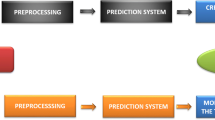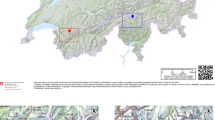Abstract
Renewable energy sources are increasing their importance and presence in the energy production sector due to their null or almost null greenhouse gas emissions. However, the main disadvantage of this type of system is the dependence on weather conditions. This research proposes using a virtual sensor to measure the wind speed 10 m above ground through variables measured at ground level. The modeling process followed a feature selection step before applying four machine learning techniques. The implemented virtual sensor accurately estimated the wind speed at 10 m, an interesting tool to eliminate the physical sensor’s buy, installation, and maintenance.
Access this chapter
Tax calculation will be finalised at checkout
Purchases are for personal use only
Similar content being viewed by others
References
Sotavento web page (2023). https://www.sotaventogalicia.com. Accessed 4 Mar 2024
Botchkarev, A.: Performance metrics (error measures) in machine learning regression, forecasting and prognostics: properties and typology. arXiv preprint arXiv:1809.03006 (2018)
Czajkowski, M., Kretowski, M.: The role of decision tree representation in regression problems - an evolutionary perspective. Appl. Soft Comput. 48, 458–475 (2016). https://doi.org/10.1016/j.asoc.2016.07.007, https://www.sciencedirect.com/science/article/pii/S1568494616303325
Energy Institute Statistical Review of World Energy: Energy Institute Statistical Review of World Energy 2023 (2023)
Engel, Y., Mannor, S., Meir, R.: The kernel recursive least-squares algorithm. IEEE Trans. Signal Process. 52(8), 2275–2285 (2004)
Haller, A.: Influence of agricultural chains on the carbon footprint in the context of European green pact and crises. Agriculture 12(6), 751 (2022)
Imandoust, S.B., Bolandraftar, M., et al.: Application of k-nearest neighbor (KNN) approach for predicting economic events: theoretical background. Int. J. Eng. Res. Appl. 3(5), 605–610 (2013)
Ivanov, A., Bezyayev, A., Gazin, A.: Simplification of statistical description of quantum entanglement of multidimensional biometric data using symmetrization of paired correlation matrices. J. Comput. Eng. Math. 4, 3–13 (2017). https://doi.org/10.14529/jcem170201
Karakislak, I., Hildebrand, J., Schweizer-Ries, P.: Exploring the interaction between social norms and perceived justice of wind energy projects: a qualitative analysis. J. Environ. Policy Plann. 25(2), 155–168 (2023)
Khan, M.A., Khan, M.Z., Zaman, K., Naz, L.: Global estimates of energy consumption and greenhouse gas emissions. Renew. Sustain. Energy Rev. 29, 336–344 (2014)
Kusiak, A., Zheng, H., Zhang, Z.: Virtual wind speed sensor for wind turbines. J. Energy Eng. 137(2), 59–69 (2011). https://doi.org/10.1061/(ASCE)EY.1943-7897.0000035, https://ascelibrary.org/doi/abs/10.1061/(ASCE)EY.1943-7897.0000035
Li, Y., Shen, X.: A novel wind speed-sensing methodology for wind turbines based on digital twin technology. IEEE Trans. Instrum. Measur. 71, 1–13 (2022). https://doi.org/10.1109/TIM.2021.3139698
Ostertagová, E.: Modelling using polynomial regression. Procedia Eng. 48, 500–506 (2012)
Yin, Z., et al.: Implication of electrification and power decarbonization in low-carbon transition pathways for China, the US and the EU. Renew. Sustain. Energy Rev. 183, 113493 (2023)
Acknowledgments
Antonio Díaz-Longueira’s research was supported by the Xunta de Galicia (Regional Government of Galicia) through grants to Ph.D. (http://gain.xunta.gal), under the “Axudas á etapa predoutoral” grant with reference: ED481A2023072.
Míriam Timiraos’s research was supported by the Xunta de Galicia (Regional Government of Galicia) through grants to industrial Ph.D. (http://gain.xunta.gal), under the Doutoramento Industrial 2022 grant with reference: \(04\_IN606D\_2022\_2692965\)
This work has been supported by Centro Mixto de Investigación UDC-NAVANTIA (IN853C 2022/01), funded by GAIN (Xunta de Galicia) and ERDF Galicia 2021–2027.
Álvaro Michelena’s research was supported by the Spanish Ministry of Universities (https://www.universidades.gob.es/), under the “Formación de Profesorado Universitario” grant with reference FPU21/00932.
Xunta de Galicia. Grants for the consolidation and structuring of competitive research units, GPC (ED431B 2023/49)
CITIC, as a center accredited for excellence within the Galician University System and a member of the CIGUS Network, receives subsidies from the Department of Education, Science, Universities, and Vocational Training of the Xunta de Galicia. Additionally, it is co-financed by the EU through the FEDER Galicia 2021-27 operational program (Ref. ED431G 2023/01).
Author information
Authors and Affiliations
Corresponding author
Editor information
Editors and Affiliations
Ethics declarations
Disclosure of Interests
The authors have no competing interests.
Rights and permissions
Copyright information
© 2024 The Author(s), under exclusive license to Springer Nature Switzerland AG
About this paper
Cite this paper
Díaz-Longueira, A., Arcano-Bea, P., Timiraos, M., Michelena, Á., de Cos Juez, F.J., Calvo-Rolle, J.L. (2024). Wind Speed Virtual Sensor for Small Wind Turbine. In: Zayas-Gato, F., Díaz-Longueira, A., Casteleiro-Roca, JL., Jove, E. (eds) Distributed Computing and Artificial Intelligence, Special Sessions III - Intelligent Systems Applications, 21st International Conference. DCAI 2024. Lecture Notes in Networks and Systems, vol 1173. Springer, Cham. https://doi.org/10.1007/978-3-031-73910-1_8
Download citation
DOI: https://doi.org/10.1007/978-3-031-73910-1_8
Published:
Publisher Name: Springer, Cham
Print ISBN: 978-3-031-73909-5
Online ISBN: 978-3-031-73910-1
eBook Packages: Intelligent Technologies and RoboticsIntelligent Technologies and Robotics (R0)




